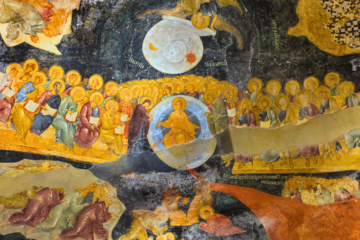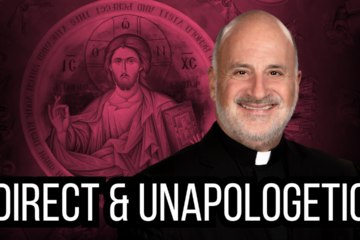Metropolitan of Pisidia Sotirios
The most frequently heard exhortation of the Church which the faithful who attend daily Services hear is, “Let us commend ourselves and one another, and our whole life to Christ our God.” The Celebrant says this multiple times (as many as ten during Matins and the Divine Liturgy), and some may wonder: Why is this repeated so much?
The answer to this question is simple, in that its repetition shows how important it is for a person to entrust their whole life to our Lord and God Jesus Christ. This desire to do so is also expressed elsewhere in the Divine Liturgy, in the Prayer just before the Lord’s Prayer: “We entrust to You, loving Master, our whole life and hope…” By expressing this commitment to the Lord with these words and more, we acknowledge that we have nothing of our own. As St. Paul the Apostle writes, all that we are (body, spirit and soul) belong to God (see 1 Corinthians 5:15-20). We are God’s creatures, and even when humanity turned against their Creator, it was the Son of our God again who, as the illumined St. Paul repeats, brought us back with the price of His own Precious Blood (see 1 Corinthians 6:19-20 and 7:23). Just because we belong to God, this does not mean that God forces us to be close to Him. He wants our relationship with Him to be freely chosen, in that we make the decision (and act accordingly) to entrust “our entire life” to His omnipotent and caring hands.
Sadly, it often happens that we forget God in the difficulties we have in our lives. Instead of turning to Him, humanity tries to face the adversity and sorrows of life alone. This only increases suffering, and when resolution or relief cannot be found, they lose hope. For those Christians who have put their faith and trust in the benevolent Lord, doing all that they can in every situation, a different result can be seen. By giving ourselves over completely to the divine will of God, we find peace instead of despair. Our All Loving God will always be at our side!
St. Peter the Apostle offers us words of great strength: To give everything to the Lord, “for He cares for you” (see 1 Peter 5:7). In other words, do not worry! The Lord loves humanity deeply, and is not indifferent to our problems. Holy Scripture, both Old and New Testament, is full of God’s miraculous intervention in the lives of human beings who faced danger, hunger, drought, injustice, enemies and every other kind of trial. Let us remember the crossing of the Red Sea by the Israelites; the manna and the quails which God sent from heaven every day for 40 years; and the five loaves of bread and two fish, which our Lord Jesus Christ blessed and multiplied to such an extent that five thousand men (along with innumerable women and children) ate and were filled, with some even being left over! All of this was done, not by the request of the people, but because the Lord saw on His own the needs of His people, doing so because “He cares for us”.
To commend “Ourselves and one another” not only means ourselves, but also those around us and have a connection with, which includes children, family and neighbors. It means that we have complete trust in God’s love and providence, having faith that Christ our God will lead us through any storm. When we take refuge in the All-merciful God, our suffering is removed, and He settles everything in the best possible way.
It must be said, however, that it is often necessary for us to show patience and be attentive to what the Lord is doing for us. When God delays in freeing us from a difficult circumstance, this does not mean that He has forgotten us. Unlike human beings, God never forgets. What is happening here, is that God is waiting for the appropriate time to intervene, when it will have the most benefit to us. When our troubles seem overwhelming, we should not be anxious, but instead remember the words of our Lord Jesus Christ: “The things which are impossible with men are possible with God” (Luke 18:27). Nothing is difficult for Almighty God.
If we start to have the thought that God has abandoned us and is doing nothing, then we have to look inward, reflecting on whether it is our own lack of faith and confidence in God that is hindering the action of His Grace. It is indeed tragic, that we have the help of divine power, and because of our weakness, ignorance or lack of faith, we are not able to accept or acknowledge the blessings of the Lord’s supreme love.
My beloved brothers and sisters! Every time we hear the exhortation of the Celebrant, “Let us commend ourselves and one another, and our whole life to Christ our God”, let us make sure that we are entrusting our own selves to Christ – with all our anxieties, fears, agonies and needs; and let Him also resolve all these, in any way He may decide to act.
Source: pemptousia.com




0 Comments